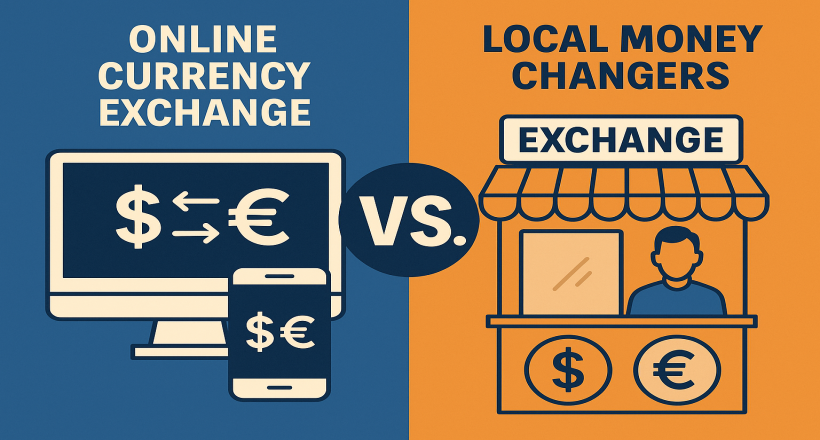We are using a merchant for PayPal and Stripe so in order to buy from their gateway you have to buy a minimum of 100 PKR equivalent.

In today's digital-first world, currency exchange isn't just about walking up to a booth at a local market or airport anymore. With online currency platforms booming, the old-school local money changers now have stiff competition. But when you’re faced with the decision of online currency exchange vs. local money changers, how do you choose the better option?
Let’s break it all down so you can make the smartest, safest, and most cost-effective decision.
Online currency exchange platforms are websites or apps that allow users to convert money from one currency to another without leaving their homes. Think of it like ordering pizza – only instead of food, you’re ordering foreign cash, which may get delivered or deposited into your account.
Local money changers are physical shops or individuals that exchange currency in-person. They’ve been around forever, especially in travel-heavy areas like airports, shopping malls, and border towns.
With online exchange services, you can convert money anytime, anywhere. No standing in queues. No wasting fuel. Just a few taps, and you're done.
Many online platforms offer interbank or mid-market rates, which are usually far better than the rates offered by street vendors or airport counters.
Top platforms use encryption, verification steps, and are often regulated by financial authorities, making your transactions secure.
Some online services charge undisclosed platform fees or bank transfer charges that can sneak up on you. Also, delivery of cash or credit to your account can take 1-3 business days, which isn’t ideal for last-minute plans.
No waiting. You give cash, you get cash. Perfect if you're heading to the airport right now or dealing with a cash-only country.
Unlike fixed rates online, local vendors may negotiate, especially for larger amounts. Sharpen your bargaining skills!
Most local changers follow typical business hours, meaning no access on weekends, holidays, or after hours.
Carrying large sums of cash always carries theft or loss risks. Plus, not all changers are regulated or trustworthy.
Online: May take hours or days.
Offline: Immediate cash handover.
Online: Often better, with real-time updates.
Offline: Typically includes hefty markups.
Online: May show breakdowns, but small print matters.
Offline: Hard to know unless you ask.
Online: Click-based, convenient, but less personal.
Offline: Face-to-face service, sometimes friendlier.
If you’re planning your trip ahead of time, using online platforms can help you lock in better rates before leaving.
Companies often prefer online platforms for bulk or recurring exchanges, especially due to record-keeping and automation features.
Online exchanges offer real-time data, alerts, and tools, making them ideal for investors and forex traders.
Lost your card or need quick foreign cash? Local changers are your best bet.
For tiny conversions, online platform fees may not be worth it. A quick offline trade may be more economical.
If you’re in a rural area or your phone just died – cash changers save the day.
Always verify whether the exchanger is licensed by financial authorities. This goes for both online and offline.
Online platforms usually come with hundreds of reviews and star ratings – a great indicator of service quality.
Online platforms with 2FA, encryption, and biometric logins offer a high level of safety for your funds.
Even platforms that say “zero fees” usually add a margin to the rate itself.
Some websites charge service, convenience, or handling fees, especially during high-demand seasons.
Local changers may not disclose commissions upfront. Always ask before exchanging.
Websites like X-Rates, Wise, or Google FX rates can help compare live rates.
Airport changers are convenient but overpriced. Only use in emergencies.
Keep an eye on trends. You can save a significant amount by exchanging on a strong day for your local currency.
Trusted platforms are usually regulated by authorities like:
FCA (UK)
FinCEN (USA)
SECP (Pakistan)
Offline changers should display their license, registration number, and government-approved rate list.
Online platforms usually email you a full breakdown – excellent for tax or business records.
Local changers may issue handwritten or stamped receipts – not ideal for audits or digital filing.
Apps like Wise, Revolut, and Payoneer are transforming the industry, making it easier and faster.
With Bitcoin and USDT becoming popular, many platforms now offer crypto-fiat exchanges, bridging modern and traditional finance.
So, which is better: online currency exchange or local money changers?
It really depends on your needs.
If you’re looking for convenience, security, and better rates, online is the clear winner.
But if you need quick, small, in-person transactions, your neighborhood money changer still holds value.
The smart approach? Use both depending on the situation – just stay informed and compare your options each time.
Yes, if you use regulated platforms that offer encryption, user verification, and 24/7 support.
Sometimes, especially if you’re exchanging large sums and can negotiate. But online platforms usually win.
It depends on the provider. Some offer same-day transactions, others take 1–3 business days.
Only in emergencies. They offer the worst rates and highest fees.
Very few offer this service. For crypto exchanges, online platforms are better.